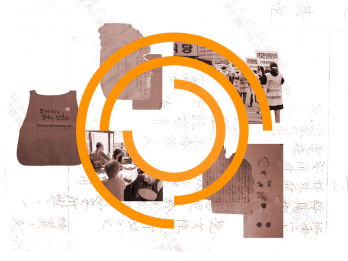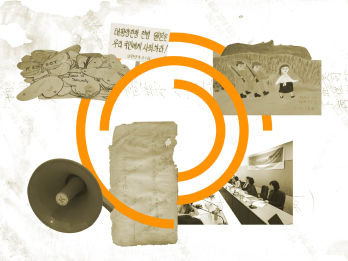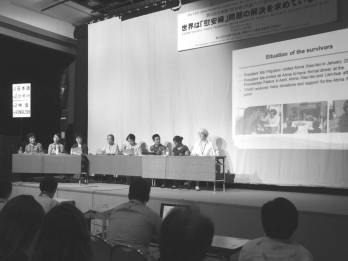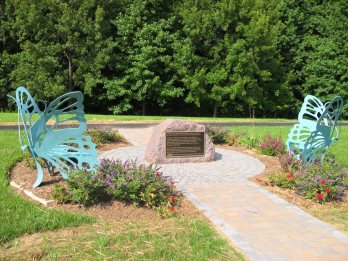
In Timor-Leste, a small island near Indonesia, many supporters are working to amplify the voices of the Japanese Military “Comfort Women” victims, who have been marginalized amid government indifference and social stigma. Meanwhile, a professor in the United States across the Pacific is teaching university courses on the history of “Comfort Women,” a subject rarely mentioned in textbooks, and emphasizes that society can stop violence against women by facing the dark sides of the past. Furthermore, some argue that making the history of “Comfort Women” an international official record is crucial to prevent the repetition of such an unfortunate history.
Bringing the invisible victims back to the center of attention and recognizing the “Comfort Women” issue as a universal human rights issue for everyone living in the present, rather than a past issue of a few, is the starting point of the “Comfort Women” discourse. In commemoration of the 2024 International Memorial Day for Japanese Military “Comfort Women,” the webzine Kyeol introduces various movements made at home and abroad to bring the Japanese Military “Comfort Women” issue, which has lingered on the periphery of history, to the forefront as a core agenda of women’s rights.
For the Joint Nomination of Documents on the Japanese Military “Comfort Women” to UNESCO Memory of the World Register (3)
Typically, the UNESCO Memory of the World (MoW) program is managed by a small team at UNESCO Headquarters, along with the International Advisory Committee (IAC), which comprises 14 experts in documentary heritage. The Register Subcommittee (RSC), under the IAC, pre-screens applications to assess their potential for inscription and reports its findings to the IAC meeting. The IAC oversees the project’s operation, holds meetings every two years to review submitted applications, selects candidates for inscription, and then recommends its decision to the UNESCO Director-General. The results are officially announced by the Director-General of UNESCO.
Decision to Postpone Inscription Pending “Dialogue”
In 2017, a series of “unusual” events occurred that deviated significantly from the typical process. The application deadline, initially set for late March 2016, was extended to May 31. Additionally, the IAC meeting, originally scheduled for September 2017, was pushed back to October 24 without any explanation. Even more surprising was a report from Japan, released before the IAC meeting had even taken place, which stated that the decision to register the documents related to the Japanese Military “Comfort Women” would be postponed. These inexplicable developments were inconsistent with the established process up to that point.
On October 16, about ten days before the postponed IAC meeting, UNESCO’s Executive Board, the organization’s key decision-making body, convened. The Executive Board approved the addition of a clause allowing for a decision that “requires ‘dialogue’ between two applications with conflicting views.” Additionally, at the IAC meeting held on October 24, an unprecedented decision was made to “postpone pending dialogue” regarding the inscription of documents related to the Japanese Military “Comfort Women.” Upon receiving this decision, the Japanese Military “Comfort Women” Victims Support and Commemoration Project Team (hereinafter referred to as Project Team) immediately exercised its right to speak and raised the issue. However, on October 30, the Director-General of UNESCO announced the deliberation results, stating that “dialogue between the two applicants” from Korea and Japan would proceed without further action.
It was not difficult to infer that the anomalies during the 2017 UNESCO MoW inscription process were orchestrated by the Japanese government. The Japanese side applied hastily after the deadline had been extended, which led to the perception that there were “conflicting views” regarding the documents on the Japanese Military “Comfort Women.” Citing these conflicting views, the IAC meeting was postponed, and an unprecedented decision was made to “postpone pending dialogue,” invoking the “dialogue” regulation established by the Executive Board.
![[Photo 1] The original UNESCO MoW decision document released in October 2017 [Photo 1] The original UNESCO MoW decision document released in October 2017](https://kyeol.kr/sites/default/files/%E1%84%89%E1%85%A1%E1%84%8C%E1%85%B5%E1%86%AB%202_2017%E1%84%82%E1%85%A7%E1%86%AB%2010%E1%84%8B%E1%85%AF%E1%86%AF%20%E1%84%80%E1%85%A7%E1%86%AF%E1%84%8C%E1%85%A5%E1%86%BC%E1%84%86%E1%85%AE%E1%86%AB%20%E1%84%8B%E1%85%AF%E1%86%AB%E1%84%86%E1%85%AE%E1%86%AB.png)
The Exploited History of Japanese Military “Comfort Women”: Who Is Creating Historical Conflicts?
Japan’s aggressive diplomatic activities are not new. Although the history wars surrounding UNESCO are often said to have begun in 2014, when China applied for the inscription of the Nanjing Massacre documents and the Japanese Military “Comfort Women” records, it is more plausible to view the real beginning as Japan’s attempt to have Meiji-era industrial heritage sites, including Hashima Island, inscribed as UNESCO World Heritage sites. Following former Prime Minister Shinzo Abe’s “Strong Japan, Proud Japan” slogan, Japan pursued the inscription of coal and mining industry sites under the name “Meiji Japan’s
![[Photo 2] Director Shin Hye-soo raising the issue at the 2017 IAC meeting [Photo 2] Director Shin Hye-soo raising the issue at the 2017 IAC meeting](https://kyeol.kr/sites/default/files/%E1%84%89%E1%85%A1%E1%84%8C%E1%85%B5%E1%86%AB%201.jpeg)
Industrial Revolution.” Among these sites was Shokasonjuku Academy, a school run by right-wing figure Yoshida Shoin, whom Abe admired. The inclusion of Shokasonjuku, known as a breeding ground for imperialism, signified an attempt to acknowledge Japan’s colonial rule and aggression as a proud part of its history. In contrast, Japan has sought to erase the history of the forced mobilization and suffering endured by Koreans and Chinese in industrial facilities such as Hashima Island.
In response to Japan’s provocation, China and South Korea naturally voiced strong criticism, and UNESCO adopted a cautious stance. It was within this context that China applied for the registration of documents related to the Nanjing Massacre and the Japanese Military “Comfort Women.” By seeking to inscribe these two historical facts, both denied by Japanese historical revisionists, China aimed to expose Japan’s responsibility for its imperialist aggression and war crimes. Until this period, both the Chinese and Japanese governments had left the task of pursuing UNESCO’s MoW inscriptions to the private sector. However, from this point on, they began to take a direct role. Former Prime Minister Abe accused China of politically contaminating UNESCO, but behind the scenes, both governments were deeply involved in UNESCO’s decision-making process.
China applied for the inscription of the Nanjing Massacre documents and the Japanese Military “Comfort Women” records but did not expect both to succeed. Anticipating inevitable conflict with Japan, China judged that it would be difficult for both applications to be accepted. China focused on the Nanjing Massacre documents and used the Japanese Military “Comfort Women” records as a bargaining chip—a strategic sacrifice aimed at gaining concessions. The fact that International Committee for the Joint Nomination of Documents on the Japanese Military “Comfort Women” to UNESCO Memory of the World Register (ICJN), comprising 15 organizations from eight countries including China, was already preparing the “Voices of the ‘Comfort Women’” application likely made this sacrifice easier for China to consider.
After the successful inscription of the Nanjing Massacre documents on UNESCO’s MoW Register, the Chinese government ceased actively supporting the registration of the Japanese Military “Comfort Women” records. When the Project Team attempted to submit the “Voices of ‘Comfort Women’” application, it felt that China was actively hindering its efforts due to China’s relentless pressure to prevent the use of Taiwan’s official name. Both Japan and China have, in different ways, exploited or sacrificed the Japanese Military “Comfort Women” issue by placing it at the forefront of their historical disputes.
The inscription of the Nanjing Massacre documents as a UNESCO MoW in 2015 came as a significant shock to Japanese right-wingers. This event marked a turning point for the Abe administration to intensify its history war. In a meeting with Liberal Democratic Party members, former Prime Minister Abe remarked, “In two years, the ‘Comfort Women’ issue will come up. It’s crucial to be fully prepared from now on,” signaling a strong push to block the inscription of the Japanese Military “Comfort Women” records. Subsequently, Japan announced that it would suspend its financial contributions to UNESCO and demanded reforms to the inscription system.
After Japan exerted overt diplomatic pressure, UNESCO relented and announced that it would begin revising its regulations. In 2015, the IAC placed the issue on its agenda for discussion. At the time, Japan anticipated that completing the revision process before the 2017 meeting and conducting reviews under the new regulations would enable it to block the inscription of the Japanese Military “Comfort Women” records. However, a comprehensive revision of the regulations did not occur. Instead, the 202nd session of the Executive Board concluded with the insertion of a clause stating that, as a compromise or workaround, “a decision may be made to require a ‘dialogue’ between two applications with conflicting views” (202 EX/PX/DR 15.8, Item 15). The IAC then used this clause to postpone the inscription of the Japanese Military “Comfort Women” records. In response, the Korean Ministry of Foreign Affairs protested, and efforts to pursue the inscription were stalled for over five years.
Emerging History Records: The Slow-moving “Dialogue” Process
As of late August 2024, the World Heritage inscription project is suspended, but the two applicants for the Japanese Military “Comfort Women” records are engaging in a “dialogue process” by mutual agreement. However, this process does not have the support of the UNESCO Secretariat. The Secretariat has not provided any details about the dialogue process, including when it will start, how it will proceed, when it will end, and what will happen if the dialogue fails to resolve.
The ICJN has consistently argued that since the inscription application was made in 2017, it should be governed by the old regulations, not the new ones. Additionally, it has maintained that after the dialogue concludes, the RSC assessment should be accepted and the joint nomination should proceed. The materials submitted by the Japanese side, consisting of three Japanese organizations and one American organization, include a total of six documents.[1] These documents are objectively significant. Among them, the materials held by the National Archives and Records Administration (NARA) of the United States and the Japan Ministry of Defense[1] are also included in the “Voices of ‘Comfort Women’” collection, indicating some overlap. Although the other documents held by the Ministry of Defense and the Japan Media Reporting and Production Research Centre are not included in the “Voices of ‘Comfort Women’” collection, they are important documents that could be included at any time. Therefore, the ICJN considered that discussing these documents was entirely feasible.
In May 2018, the UNESCO Secretariat announced that it had selected a mediator without any prior exchange of information regarding the topics and methods of the dialogue. Despite this, the ICJN remained committed to proceeding with the dialogue process in good faith and prepared to accept the mediator. However, the first mediator resigned after one year, having failed to establish a concrete and meaningful dialogue process. In June 2019, the UNESCO Secretariat appointed Ingrid Parent, a renowned Canadian archivist and former president of the International Federation of Library Associations, as the second mediator. Ingrid Parent aimed to facilitate an agreement on the “Terms and Conditions for Holding a Dialogue Regarding Two Nominations Concerning ‘Comfort Women’ for the Memory of the World International Register” to enable dialogue between the two applicants. From 2019 to 2024, the ICJN engaged in three virtual meetings and numerous email exchanges with the mediator to finalize the conditions for holding the dialogue. However, Japan repeatedly introduced additional conditions, which ultimately prevented the dialogue from taking place. Ingrid Parent completed her term without achieving a resolution. As of now, the UNESCO Secretariat has not provided any further guidance on how the dialogue process will proceed in the future.
In 2022, as a result of Japan’s aggressive diplomacy, UNESCO’s MoW inscription rules were revised to require all documents to be submitted through national governments. Additionally, if a concerned country objects, the application is halted from entering the review process and must instead undergo a so-called “dialogue” procedure. Under these revised rules, any attempt by a victimized country to submit documents related to the Japanese Military “Comfort Women” is likely to be blocked before even reaching the review stage due to Japan’s opposition.
Thus far, the 14 organizations representing citizen groups from seven different countries have navigated various obstacles, sometimes avoiding them and other times overcoming them, as they advanced the inscription process. After enduring a long and challenging journey to jointly nominate the “Voices of ‘Comfort Women,’” they remain steadfast in their conviction that they cannot give up at this stage.
The ICJN will endure the unreasonable processes at the forefront of the historical battles unfolding within UNESCO, participating in the dialogue process with patience and dedication, and ultimately prevail. Furthermore, it will persist in its efforts and advocacy to protect vital global documents from various threats, upholding UNESCO’s MoW principles and vision. This includes ensuring that “the world’s documentary heritage should be fully preserved for all, with due recognition of cultural practices and practicalities, and permanently accessible to everyone without interference,” and defending these principles against any unjust power.
The new records generated during this process will become “contemporary historical documents,” demonstrating that the issue of Japanese Military “Comfort Women” extends to the present and that justice is being pursued for all victims.
Footnotes
- ^ The documents submitted by Japan for inscription are as follows: (1) Three documents from NARA (1.1 Japanese Prisoner of War Information Report No.49, October 1, 1944, by the United States Office of War Information, 1.2 Allied Translator and Interpreter Section, South West Pacific Area (ATIS), 1.3. South East Asia Translator and Interrogation Centre (SEATIC) (2) One document from the National Archives of Japan (2.1 September 4, 1945, 「米兵の不法行為対策資料に関する件」) (3) One document from Japan’s Ministry of Defense (3.1 March 4, 1938, 「軍慰安所従業婦等募集に関する件」) (4) One document from the Japan Media Reporting and Production Research Centre (4.1 2006 年昭和研究所特別年鑑(元軍人の証言資料))
- ^ Since the Japanese government does not acknowledge the forced mobilization of “Comfort Women,” the National Action for the Resolution of the Japanese Military Comfort Women Issue has conducted a campaign to send discovered official documents to the Prime Minister’s Office. The Japanese Committee for Joint Nomination to the UNESCO MoW Register considered this campaign of sending official documents as relevant material for resolving the issue and therefore applied for the inscription of copies of these documents.
Related contents
-

- Voices of “Comfort Women”: A Global Civic Movement for Memory
-
The suffering of the Japanese Military “Comfort Women,” one of the most tragic human rights abuses of the 20th century, should be preserved and managed as historical documentary heritage. This is crucial to prevent such atrocities from recurring and provide a lesson to future generations.
-

- The Unique and Irreplaceable “Voices of ‘Comfort Women’”
-
The history of the Japanese Military “Comfort Women” issue has challenged long-standing conservative cultural norms regarding women and sexuality in Asia by amplifying the voices of the victims. Moreover, it has contributed to the establishment of globally significant norms and values related to women’s human rights. This means that the records documenting the Japanese Military “Comfort Women” issue and related activities meet the criteria of “world significance.”
-

- The supranational nature of the 'comfort women' issue and the ‘glocalization’ of memories, Part 1
-
Written by Shin Ki-young, Professor at Ochanomizu University, Japan
-

- The supranational nature of the 'comfort women' issue and the ‘glocalization’ of memories, Part 2
-
Written by Shin Ki-young, Professor at Ochanomizu University, Japan
- Writer Hye-in Han
-
Hye-in Han is a Research Fellow at the Asia Peace & History Institute, where her research focuses on historical disputes and dialogue. Since 2014, she has been an active member of the project team for the “International Committee for Joint Nomination of Documents on the Japanese Military ‘Comfort Women’ to UNESCO Memory of the World Register.”
hanhi822@gmail.com